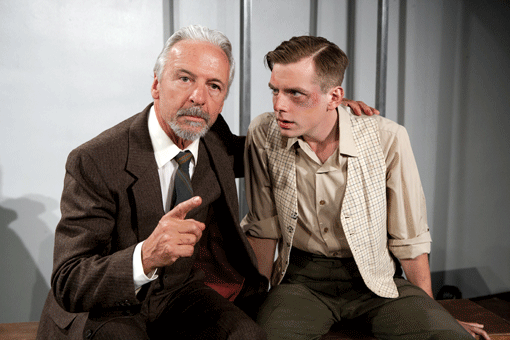Playwright Nathan Englander is the first to recite a theatrical kaddish for the Yiddish poets murdered by Stalin in 1952
By DORIS RUBENSTEIN
Treachery! Blackmail! Deception!
Nathan Englander’s play, The Twenty-Seventh Man — being presented through Nov. 8 by the Minnesota Jewish Theatre Company — has it all. But it also has compassion, loyalty, and the issues of free speech and the relationship between art and truth written into the script.
What, exactly, is The Twenty-Seventh Man about?
Following the historical record of the Stalinist purges in the early 1950s and Englander’s original short story, the play is about 26 Soviet-era Yiddish writers — condensed into three who share a prison cell: Moishe Bretzky (Joher Coleman), Yevgeny Zunser (Michael Kissin) and Vasily Korinsky (Gabriel Murphy). They are joined by the “27th man” who eventually reveals himself to be a hermetic unpublished Yiddish writer calling himself Pinchas Pelovits (Michael Torsch).
Kurt Schweickhardt has cast them well; they all seem to fit the physical demands of the roles, and Annie Cady has costumed them well to enhance those impressions.

This is a jail cell and the director has done an equally good job in using Michael Hoover’s stark set to keep the players from becoming stage-bound and allowing them room to enter the audience’s mind. Conversations in the prison cell range from woe over their unhappy situation to the elevated role that their art has played in the life of Soviet Jewish society. Such intellectualism contrasts with and leads to acts of prison brutality.
Naveh Shavit-Lonstein, known on the Twin Cities stage since he was not much more than a toddler, plays the prison guard. Again, he is well cast; the 11th grader has not lost his childish complexion, yet carries off the violent scenes with a professionalism that only years on the stage can provide. Such a character begs the question: How can someone so young do such cruel acts?
The prison guard represents the physical brutality forced upon the prisoners. MJTC regular Skylar Nowinski, in the role of the Soviet agent in charge, represents the threatening psychological and political atmosphere that surrounds them. He has no scruples, no pity and no loyalty, except to the Party. It is the scene between him and Vasily Korinsky — who believes himself to be a flawless party member — that crystallizes the truth of his imprisonment: his crime is being a Jew, not party disloyalty.
Most American Jews born after World War II are completely unaware of the rich intellectual life that Stalin allowed and encouraged to flourish in the Soviet Union throughout most of his early years in power. Indeed, Stalin allowed most ethnic groups to develop and control their own cultural institutions. Stalin’s descent into paranoia spurred the events of this play.
As the gluttonous Moishe Bretzky declares, “(Stalin) is out to kill the Jewish soul!”
In the Jewish world, little could compare to it except the Yiddish cultural life that thrived on New York’s Lower East Side. The struggling survivor of that short era in American Jewish history is the newspaper, the Forward.
The systematic murder of Yiddish culture in the Soviet Union, as symbolized by the four prisoners, contrasts with the death by neglect of American Yiddish culture. Two generations after the events of The Twenty-Seventh Man, Englander is the first American to find a way to recite a theatrical kaddish for the death of the ones who were murdered, both the men and their artistic creations.
Little can be done to recover the lost books, poetry, plays, etc., that were wiped out along with the 26 flesh-and-blood artists who perished in front of a firing squad. The Soviet agent in charge describes the nefarious means by which they and their creators can be banished from history and memory.
In some ways, Englander, through this play, is the 27th man. He is one of those who keep the story of their lives and deaths in the public eye and history’s chronicle. Others who share Englander’s passion may explore the collection of the works of all the 26 men at Hampshire College’s Yiddish Book Center.
***
Minnesota Jewish Theatre Company (MJTC) presents the regional premiere of The Twenty-Seventh Man by Nathan Englander through Nov. 8 in the theater of Highland Park Community Center, 1978 Ford Pkwy., St. Paul.
For tickets and information, visit: www.mnjewishtheatre.org, email: info@mnjewishtheatre.org, or call 651-647-4315.
(American Jewish World, 10.23.15)



















